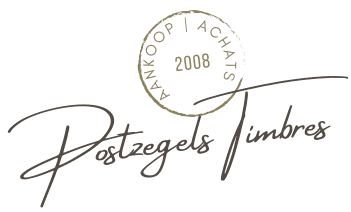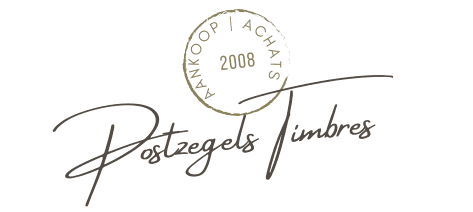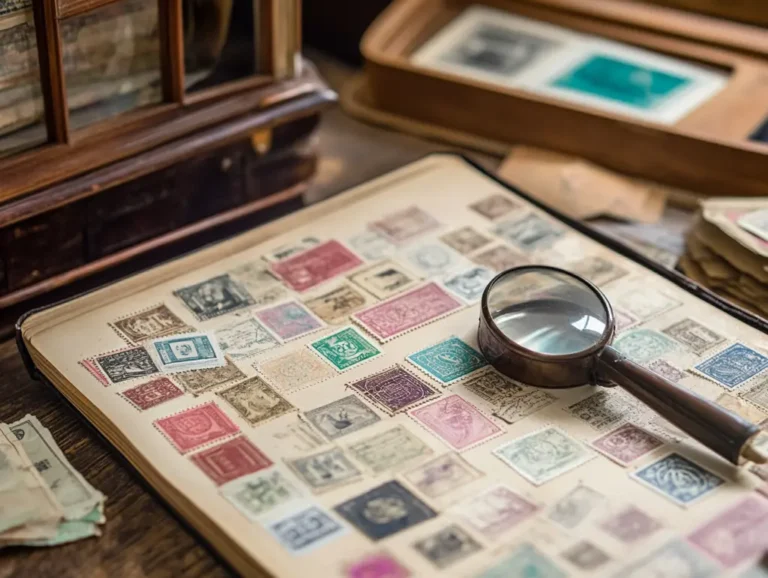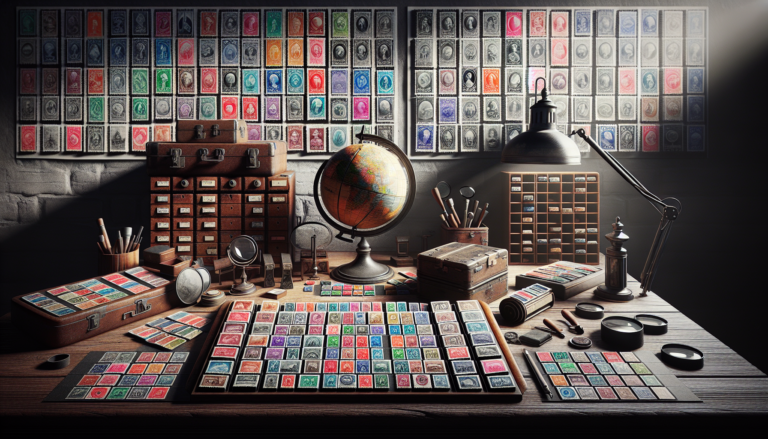You are curious, aren't you? 😊 You wonder: Who invented philately ? Hang on! Imagine yourself in an inn, the sound of the glasses that collide. This is where a spark of genius sparkled! A brilliant idea, like a shooting star. 🌠 Who invented philately ? It's Gustave Herpin, a real Word Magician!
It is not a mystery, but a beautiful trip in history. In 1864, a man named Gustave Herpin had the idea of gathering these pieces of paper called stamps . A real magician of words, who assembled two Greek terms: friendship and freedom of costs. Basically, it's a bit like you said to your friend: "Hey, I'm paying for chocolate, but I let you keep a part of it without getting paid!" »🤣
So the next time you see a stamp , remember this scene. Each stamp has a story to tell, like a good old film. So who really invented philately ? It is a mixture of passion, of friendship and, let's face it, a bit of humor at the Pascal. Come on, plunge into this adventure! 🥳
- Inventor: Gustave Herpin
- Year : 1864
- Publication: The Postage Stamp Collector
- Etymology: derived from Greek words philos (friend) and Atelei (tax exemption)
- Vision: Gather the art of collecting stamps

So, dear collector friend, you may wonder: who invented philately? In fact, the term “philately” was forged by a French enthusiast in 1864. His name was Gustave Herpin. Imagine a little, as if this word was a little stamp all by itself, waiting to be stuck in your collection ! 😄 When you wonder who invented philately , remember its importance in the world of collectors!
Summary
ToggleThe origins of this beautiful passion
Before Herpin, there was no term to designate our common passion for stamps. It was a bit like having a superhero without his name: he had power, but no one knew who he was! This is exactly what Gustave felt. So he took two Greek words. Philos for "Friend" and Ateleia , who means "tax exemption". This is how love for our little pieces of paper has found its name!
A nod to the history of the postage stamp
And now let's talk about the opening ceremony of the stamp ball. 🚀 The first postage stamps appeared in 1840 in Great Britain thanks to the ingenuity of Sir Rowland Hill. It's a bit like announcing the first comic strip of superheroes! The famous Black Penny , adorned with the face of Queen Victoria, was born. A little piece of paper that has upset the postal world! 😲
The path of philately
In the years that followed, other nations have followed suit. In France, it was not until 1849 that his first stamp issued. The Black Ceres , representing the goddess of agriculture, vibrated the hearts of stamp lovers; It cost 20 cents, not bad for a treasure, right? 😏
Have you ever thought about that?
If you want to immerse yourself in the fascinating universe of philately, do not hesitate to explore different genres. Collected by themes! Why not gather stamps on animals or on sports emissions? It can become a nice adventure. Who knows, you could even create exchanges with other collectors and become the hero of your own philatelic epic! And don't forget to ask you, who invented philately ? It could inspire you! 🚀
In search of lost stamps
To deepen the subject, it is essential to understand who invented philately and its impact on society. The stamps are not only pieces of paper; They are a reflection of stories, culture and art. So who invented philately? It's a journey through history!
If you are looking for stamps online, take a look at platforms like those of Pascal who buy your treasures on 0473 444 706, you will find a network of nice enthusiasts who can be used! It's a bit like a treasure hunt, but with letters; You could find a philatelic jewelry that will complete your collection. 💰
A touch of uncertainty
Who would have thought that a piece of paper could tell so many stories? Each stamp is like a character from a comic strip, with his own adventures. 😍 When you collect them, you are not just gathering paper. You take a link with the past. If that is not magic, I don't know what it is!
Be creative!
And why not use your stamps for artistic projects? Glue them on a notebook, draw around them and create a unique universe. It could even become a hobby just as entertaining as the collection itself. Think of that like a blank canvas, ready to receive your crazy ideas. 🎨😉
📮 Inventor of philately
| Name | Details |
|---|---|
| Gustave Herpin 🧑💼 | French collector, he created the term philately in 1864. |
| Word 📖 | Philately comes from the Greek words "philos" (friend) and "ateleia" (tax exemption). |
| First stamps 🕰️ | The first French stamps were issued in 1849. |
| Importance 🌍 | Philately has transformed the stamp collection into a world hobby. |
| Evolution 📈 | Over time, philately has gained popularity, with thousands of enthusiasts. |
Ah, philately! It may remind you of the old dusty albums that we meet with grandparents. But wait, do you know who really invented philately ? No, it's not just a bizarre name for a superhero in tights! It is above all a passion, a real adventure that begins with a man: Gustave Herpin. In 1864, he had the brilliant idea of bringing together two Greek words. Do you have them? Philos which means friend and Ateleia, the tax exemption. Magic, right?
Imagine a little! Before Gustave, assembling postage stamps was like trying to set up an Ikea furniture without notice.🤣 It looked like a puzzle without the pieces! Accustomed to the piercing shipping costs, he gave enthusiasts a way to come together around something bigger than pieces of paper. This is where philatelie was born; Let us unite to hunt these little treasures!
Speaking of your parents, you can tell them that it is a hobby that does not ask to be extravagant. Can you collect stamps that talk to you, maybe images of your favorite city or even historical figures? It's like a miniature photo album; Each stamp tells a story! When you exchange your finds, think of what Pascal would say: "The word of man is like a stamp, sometimes obliterated, but it always remains precious. »🌟
So, the acquisition of this knowledge on which invented philately is not just a matter of history. It is an invitation to dive into a world made of colors, stories, and even a little mystery, while having fun with friends! 😄
FAQ on philately
Who invented the term "philately"? ✨
It is the French collector Gustave Herpin who created this word in 1864 , combining two Greek words: "philos", which means friend, and "ateleia", which means tax exemption.
What is the first postage stamp issued in France? 🇫🇷
The first postage stamp in France, called "Black Ceres" , was issued on January 1, 1849 . value was 20 cents and represented the goddess of agriculture.
How can we start collecting stamps? 📚
To start, choose a theme that fascinates you! Brings together stamps by country, eras or heroes. Do not hesitate to go to stamp merchants or participate in exchanges between enthusiasts.
Can stamps have a financial value? 💰
Yes, some stamps can be highly sought after and therefore assert a significant sum, especially if they are rare or in perfect condition.
Where can I find stamps for my collection? 🌐
You can find stamps online, in stamp merchants, or during philatelic salons. Exchanges between collectors are also a great way to enlarge your collection.
What makes philately so exciting? 💖
Philately is much more than collecting pieces of paper. Each stamp has a story, and collecting allows you to explore the world through its history, culture and its significant events.
The pioneers of philately
| Name | Contribution |
|---|---|
| Gustave Herpin | Creator of the term philately in 1864, merging two Greek words. |
| Sir Rowland Hill | Initiator of the modern postage stamp, positioning the sender as a payer. |
| James Chalmers | Partner of Rowland Hill in the implementation of the postal system with stamps. |
| Queen Victoria | Face of the first timbre, a significant symbol for philatelists . |
| Anonymous collectors | First enthusiasts before the official appearance of philately. |
Glossary: Who invented philately?
When you collect stamps, think about who invented philately and how it changed our way of communicating and sharing stories around the world.
Philately its origin dates back to much deeper reflections on the postal system. It was in 1864 that the term "philately" was proposed by the French collector Gustave Herpin . This word is a composition of two Greek words, namely philos , which means "friend", and Ateleia , meaning "tax exemption". Herpin wanted to designate this passion shared by many collectors around the world.
Before evoking the invention of philately, it is essential to speak of the postage stamp , a fundamental object in this area. The first stamp issued, the famous "Black Penny" , was born on May 6, 1840 in Great Britain. He displayed the portrait of Queen Victoria and marked a revolution in the postal system, an alternative to a model where the recipients paid to receive their mail.
The concept of the postage stamp is attributed to Sir Rowland Hill , a high British official. The idea came to him following a scene he observed in an inn, where a waitress had to return a letter for lack of being able to pay the shipping costs. This experience aroused in him the desire to create a system where the sender would assume the costs by preparing via a sticker stuck on the envelope. Thus, in 1837, he proposed this new system which took shape three years later with the emission of the first stamp.
In France, the appearance of the postage stamp was celebrated in 1849, with the program of "Ceres noir" , representing the goddess of agriculture. This stamp then cost 20 cents, double the British rate, and was initially less adopted than its English predecessor. However, he quickly found takers and confirmed the growing craze for philately.
The stamp collection This includes choosing a theme or specialization in certain eras, nations or characters. Philatelists often opt for new or obliterated stamps, which enrich their dedicated album or workbook.
The community of philately enthusiasts has grown over the years. In France, there are currently more than 580,000 philatelists . These collectors share their passion not only through exhibitions, but also through exchanges during philatelic salons, where the spirit of mutual aid and camaraderie is omnipresent.
The world of philately is also influenced by the availability of stamps. Collectors can acquire them by various means, especially online, in physical shops, or through personal exchanges.
In short, philately, a concept introduced by Gustave Herpin , results from a story of innovation associated with the transformation of a simple piece of paper into an ambassador of multiple stories around the world. The invention of the postage stamp by Sir Rowland Hill gave birth to this fascinating practice, which continues to win followers and to be renewed over the years.
Hi to you, passionate about philately ! Have you ever heard of who invented the art of collecting stamps ? It is a real fascinating journey that you can discover. At the origin of this passion, we find the first postage stamp issued in 1840 in Belgium , which inspired thousands of stamp collections around the world, including the famous Belgian stamps . These small pieces of paper are not only a means of emancipation , they are also real works of art to collect.
In 2025, did not miss the release of new Belgian stamps Cozy Winter series and the 2026 animal stamps You can easily buy them on platforms like Bpost and their eshop stamps . Whether you are a seasoned collector or a neophyte, there is always good deals to make. Do not hesitate to explore the collections of Belgian stamps to complete your collection of stamps , leaves or sheets.
In short, philately, a concept introduced by Gustave Herpin , results from a story of innovation associated with the transformation of a simple piece of paper into an ambassador of multiple stories around the world. So who invented philately ? This is a question that deserves to be asked by each enthusiast!
It is fascinating to think of who invented philately and the way in which this influences the new generations of collectors. Do not underestimate the impact of this passion!





